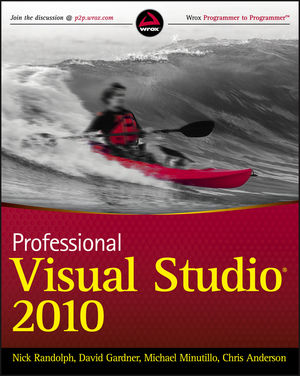Professional Visual Studio 2010ISBN: 978-0-470-54865-3
Paperback
1224 pages
May 2010
 This title is out-of-print and not currently available for purchase from this site.
|
Visual Studio allows you to create and manage programming projects for the Windows platform, and the new 2010 version has undergone a major overhaul comprised of significant changes. Written by an author team of veteran programmers and developers, Professional Visual Studio 2010 gets you quickly up to speed on what you can expect from the newest version of Visual Studio.
This book's first section is dedicated to familiarizing you with the core aspects of Visual Studio 2010. Everything you need is contained in the first five chapters, from the IDE structure and layout to the various options and settings you can change to make the user interface synchronize with your own way of doing things.
From there, the remainder of the book is broken into 11 parts:
- Getting Started: In this part, you learn how to take control of your projects and organize them in ways that work with your own style.
- Digging Deeper: Though the many graphical components of Visual Studio that make a programmer's job easier are discussed in many places throughout this book, you often need help when you're in the process of actually writing code. This part deals with features that support the coding of applications such as IntelliSense, code refactoring, and creating and running unit tests In the latest version of the .NET framework, enhancements were added to support dynamic languages and move towards feature parity between the two primary .NET languages, C# and VB. This part covers changes to these languages, as well as looking at a range of features that will help you write better and more consistent code.
- Rich Client and Web Applications: For support building everything from Office add-ins to cloud applications, Visual Studio enables you to develop applications for a wide range of platforms. These two parts cover the application platforms that are supported within Visual Studio 2010, including ASP.NET and Office, WPF, Silverlight 2 and ASP.NET MVC.
- Data: A large proportion of applications use some form of data storage. Visual Studio 2010 and the .NET Framework include strong support for working with databases and other data sources. This part examines how to use DataSets, the Visual Database Tools, LINQ, Synchronization Services and ADO.NET Entity Framework to build applications that work with data. It also shows you how you can then present this data using Reporting.
- Application Services: Through the course of building an application you are likely to require access to services that may or may not reside within your organization. This part covers core technologies such as WCF, WF, Synchronization Services and WCF RIA services that you can use to connect to these services.
- Configuration and Internationalization: The built-in support for configuration files allows you to adjust the way an application functions on the fly without having to rebuild it. Furthermore, resource files can be used to both access static data and easily localize an application into foreign languages and cultures. This part of the book shows how to use .NET configuration and resource files.
- Debugging: Application debugging is one of the more challenging tasks developers have to tackle, but correct use of the Visual Studio 2010 debugging features will help you analyze the state of the application and determine the cause of any bugs. This part examines the rich debugging support provided by the IDE.
- Build and Deployment: In addition to discussing how to build your solutions effectively and getting applications into the hands of your end users, this part also deals with the process of upgrading your projects from previous versions.
- Customizing and Extending Visual Studio: If the functionality found in the previous part isn't enough to help you in your coding efforts, Microsoft has made Visual Studio 2010 even more extensible. This part covers the automation model, how to write add-ins and macros, and then how to use a new extensibility framework, MEF, to extend Visual Studio 2010.
- Visual Studio Ultimate: The final part of the book examines the additional features only available in the Premium and Ultimate versions of Visual Studio 2010. In addition, you'll also learn how the Team Foundation Server provides an essential tool for managing software projects.
Though this breakdown of the Visual Studio feature set provides the most logical and easily understood set of topics, you may need to look for specific functions that will aid you in a particular activity. To address this need, references to appropriate chapters are provided whenever a feature is covered in more detail elsewhere in the book.
Professional Visual Studio 2010 is for all developers new to Visual Studio as well as those programmers who have some experience but want to learn about features they may have previously overlooked.
If you are familiar with the way previous versions of Visual Studio worked, you may want to skim over Part I, which deals with the basic constructs that make up the user interface, and move on to the remainder of the book where the new features found in Visual Studio 2010 are discussed in detail. While you may be familiar with most of Part I, it is worth reading this section in case there are features of Visual Studio 2010 that you haven't seen or used before.
If you're just starting out, you'll greatly benefit from the first part, where basic concepts are explained and you're introduced to the user interface and how to customize it to suit your own style.



